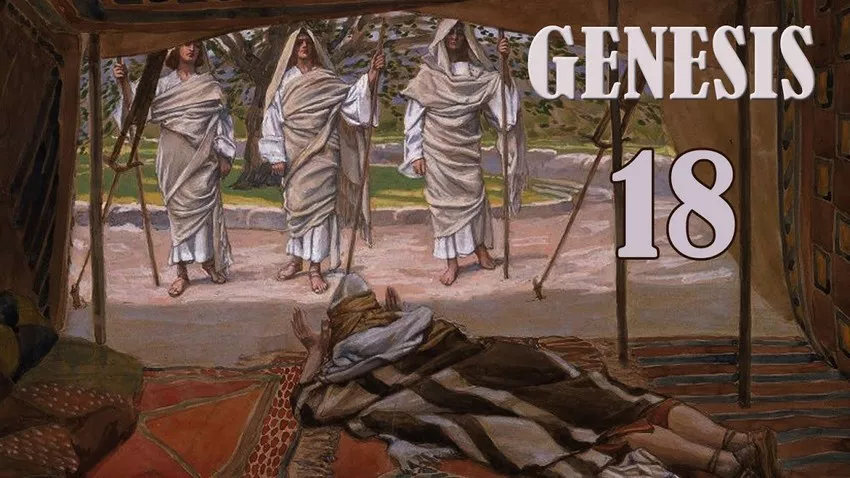Genesis Chapter 18 Summary
Genesis Chapter 18 recounts a significant moment in the lives of Abraham and Sarah. The chapter begins with Abraham sitting at the entrance of his tent when he encounters three visitors. Recognizing them as divine beings, Abraham offers them hospitality, preparing a feast. During the meal, one of the visitors reveals that Sarah will bear a son despite her old age. Sarah laughs in disbelief, but the visitor reassures her, stating, “Is anything too hard for the Lord?” The chapter also includes a dialogue between the Lord and Abraham about the impending destruction of Sodom and Gomorrah. Abraham intercedes for the cities, negotiating with God to spare them if righteous people can be found. The chapter highlights themes of faith, hospitality, and divine justice, demonstrating God’s promise and mercy.
Bible Genesis Chapter 18
Welcome to read Genesis Chapter 18. Here is the list of Genesis Chapter 18:
What Does Genesis Chapter 18 Teach us?
Genesis Chapter 18 is a rich and multi-faceted chapter that offers profound insights into various aspects of faith, divine interaction, and moral conduct. This chapter, set in the context of Abraham and Sarah’s lives, provides enduring lessons that are relevant to both personal spirituality and ethical behavior.
1. The Importance of Hospitality
One of the most immediate teachings of Genesis Chapter 18 is the significance of hospitality. The chapter begins with Abraham sitting at the entrance of his tent on a hot day. When he notices three visitors approaching, he rushes to greet them and offers them generous hospitality. Abraham provides them with water, a place to rest, and a meal prepared with care.
This act of hospitality is not merely a cultural norm but a reflection of deep spiritual values. In offering such kindness, Abraham demonstrates a profound respect for others and a willingness to serve. The New Testament also emphasizes the importance of hospitality, as seen in Hebrews 13:2, which suggests that such acts can be a way of unknowingly entertaining angels. This teaches us that our everyday actions of kindness and generosity are seen and valued by God.
2. Faith and the Promise of God
A central theme in Genesis 18 is the reaffirmation of God’s promise to Abraham and Sarah. When one of the visitors (revealed to be the Lord) announces that Sarah will bear a son, despite their old age, Sarah laughs in disbelief. Her reaction underscores a common human struggle with trusting in divine promises when they seem impossible.
The Lord’s response to Sarah’s laughter is revealing: “Is anything too hard for the Lord?” (Genesis 18:14). This rhetorical question serves as a powerful reminder of God’s omnipotence and faithfulness. It teaches us that no matter how improbable a situation may seem from a human perspective, God’s promises are certain and His power is beyond all limits. This lesson encourages believers to trust in God’s promises even when circumstances appear to defy logic.
3. The Power of Intercessory Prayer
Genesis Chapter 18 also highlights the role of intercessory prayer through Abraham’s interaction with God regarding the fate of Sodom and Gomorrah. When God reveals His plan to destroy the cities because of their grievous sin, Abraham engages in a profound dialogue with God. He questions whether God would destroy the righteous along with the wicked and pleads for the cities to be spared if a certain number of righteous people can be found.
Abraham’s intercession is a model of how believers can engage in prayer for others. His persistence and willingness to appeal to God’s sense of justice and mercy reflect a deep relationship with the divine. This interaction shows that prayer can be a powerful tool in seeking God’s intervention and demonstrates that God values the prayers of His people. Abraham’s dialogue illustrates the importance of standing in the gap for others and highlights the potential impact of earnest, faithful prayer.
4. The Balance of Divine Justice and Mercy
The chapter also addresses the balance between divine justice and mercy. While Abraham’s intercession showcases God’s willingness to be merciful, the eventual destruction of Sodom and Gomorrah emphasizes that divine justice is also a crucial aspect of God’s nature. The cities’ destruction serves as a reminder that while God is patient and merciful, He also holds people accountable for their actions.
This aspect of the chapter teaches that God’s nature encompasses both mercy and justice. It encourages believers to live righteously and trust that God will uphold justice. The story underscores that while God is loving and forgiving, He also addresses sin and wrongdoing, ensuring that His justice prevails.

